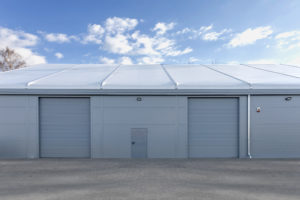Benefits of the proposed solution
The use of the roof sheathing with the aforementioned membrane allows for the full use of the properties and advantages of the two-way tension of the hall coating (usually the roofing in tent halls is stretched in one direction), implemented by innovative design solutions of our halls. The two-way tension of the coating of the hall increases the usability of the hall by the constant tension of the coating, elimination of folds, elimination of the flutter effect of the sheathing, significant extension of the technical durability of the cover. The tension of the coatings and the angle of the roof slope protect the hall against snow overload. The use of the second layer of sheathing instead of a pumped roof allows the tarpaulins to be kept at a constant distance from each other, which ensures better and equal insulation over the entire roof surface, including insulation of thermal bridges created by the structure. In addition, this solution causes that there is no need in the equipment and installation for pumping the roof, in the event of a failure, e.g. a power cut or roof perforation, there is no risk of tarpaulin sagging and the formation of the so-called water troughs or snow piles, which can overload the structure. At the same time, the roof sheathing creates a homogeneous surface with a tarpaulin strongly stretched in two directions, with an elongation of less than 1% (elongation under load).


